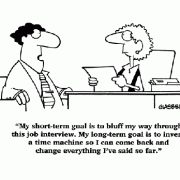“I want to offer you the job. Please be a perfect employee.”
Choosing a stranger to work with you can be a stressful and frustrating experience, especially if you are not completely sure what you are looking for. Maybe you already know someone that you think could want the job, but how will that person fit into your company? You probably don’t want to damage a friendship by falling out through work and you would be this person’s boss now.
For both sides, recruitment can be a leap of faith: everyone has high hopes when the job is offered and it can take time to see if the reality of working together is what you all hoped it would be. Focusing a little more on the pros and cons before you offer any jobs will help avoid potential disputes after you have been working together for six months.
Recruitment is not an exact science. If anyone had pinned down a guaranteed formula for matching candidates to companies, he or she would be famous and insanely wealthy. Even experienced managers have anecdotes about the people they hired who surprised them by becoming different people from the candidates they had liked.
Don’t rush to hire someone… anyone… just because you want to stop thinking about recruitment and get someone into your workplace. Even if you have work piling up, hiring someone that you have doubts about is just a quick fix that will unravel. Maybe you can cover the work in some other way for a while until you find the best new employee for you. How about a temp or a freelance?
Realising that you’ve hired someone who is a square peg when you needed to fill a round hole can be embarrassing and an unwelcome problem, especially for small teams when you need that person’s skills to cope with any backlog of work. You have to decide what to do about it. If it’s really not working, you might have to replace them, which means repeating the time, cost and hassle of finding someone else who will be a better fit with your company.
We love interviewing and our experience means we can accurately assess people and match them to jobs and companies. But some people find interviewing stressful and frustrating. Some candidates can surprise you by coming out with the most unexpected things during interviews. Some managers assess candidates too quickly (positive or negative) and do not use the interview to find out much more than they knew from looking at a CV.
Another risk is being over-optimistic: everything will be fantastic and let’s just gloss over any potential downsides, even if the candidate has just mentioned that she or he does not really have the skills and experience that you need and will probably move away in a year or so. Or too negative: none of the candidates match the ideal person you want to hire.
Final tip: remember that some areas of employment law covers candidates for jobs and especially discrimination areas. So if you refuse someone a job because she’s pregnant, you might get an Employment Tribunal claim.


